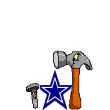BigWillie said:
Who here would know how the NCAA allows this?
Taking a team bus would equal paid transportation by a pro club. That is a violation.
Paid meals by a pro club, violation.
Taking money from a contract or signing bonus, violation.
Heck, I can remember when Eric Crouch had a sandwich (yes, an *****' sandwich) bought for him by a booster and had to pay back the amount of the sandwich before he could continue playing football.
It seems to me the NCAA plays alot of hit and miss when it comes to how they enforce their own rules.
Hell, I found out a rule just the other day that makes zero sense to me. If you attend two JUCO's, you lose your eligibility to become a D1 athlete.
Some of this junk just makes no sense to me.
Link (
see pages 24 - 25)
Chapter 5
Do’s and Don’ts During Your Collegiate Eligibility
Undoubtedly, you have many questions regarding a career in professional sports. Some issues you should consider include contact with professional sports teams, agents, attorneys and/or financial advisors. Hopefully, the following information will assist you in gathering answers. If you have further questions, please contact your institution’s compliance office representative.
You may:
• Seek counseling about a future professional athletics career through your institution’s professional sports counseling panel. The sports counseling panel can help negotiate a contract, set up an agent interview program, obtain disability insurance and help you understand NCAA rules.
• Request information from a professional team or organization concerning your professional market value.
• Be permitted to use your institution’s sports counseling panel or your head coach to contact agents, professional sports teams or professional sports organizations on your behalf. (Panel members or the head coach are not permitted to receive any compensation for such services.)
• Personally, or through your parents or legal guardians, or your institution’s professional sports counseling panel, negotiate with a professional team.
• Secure advice from an attorney or third party concerning a proposed professional contract, provided the attorney or third party does not represent you in negotiations for that contract.
• Compete professionally in one sport and be an amateur in another. (For example, you may sign a professional baseball scholarship and still compete in college basketball).
• Retain an agent whose duties are specifically limited in writing to representing you only in the sport(s) in which you compete as a professional. You may still retain your eligibility in the other sport.
• Have an “entertainment” agent for purposes of pursuing appearances on radio, television and theatre, provided your status as an athlete is not used to secure such an opportunity.
• Play in an individual all-star game after signing with an agent, provided team competition has concluded and you have completed your seasons of competition.
• Try out with a professional organization in a sport during the summer or the academic year while not a full-time student-athlete, provided you do not receive any form of expenses or other compensation from the professional organization.
• Permit yourself to receive one on-campus medical examination during the academic year by a professional league’s scouting bureau.
• In the sport of basketball, enter a professional league’s draft without jeopardizing eligibility in that sport, provided you are not drafted and you declare in writing to your institution’s director of athletics your intention to resume intercollegiate basketball participation within 30 days after the draft.
• Borrow against future earnings potential from an established and accredited commercial lending institution for the purpose of purchasing insurance against a disabling injury/illness, provided a third party is not involved in arranging for the loan.




